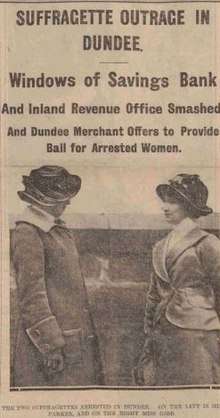Ellison Scotland Gibb
Ellison Scotland Gibb (1879–1970) was a Scottish suffragette and chess player. She was born in 1879. Her father was Peter Walker Gibb, a fish merchant, and her mother was Margaret Skirving. She was one of six siblings, one of whom was fellow suffragette Margaret Skirving Gibb. She died in Ayr in 1970.
Ellison Scotland Gibb | |
|---|---|
 Frances Parker (left) and Ellison Gibb. Evening Telegraph and Post Wednesday, 30 October 1912, page 1. | |
| Born | 6 March 1879 Glasgow, Scotland |
| Died | 1970 Ayr, Scotland |
| Occupation | Political activist, chess player |
| Parent(s) | Peter Walker Gibb Margaret Skirving |
| Relatives | Margaret Skirving Gibb (sister) |
Suffragette
She was an active member of the Women's Social and Political Union.[1] In 1910, she was appointed as the honorary secretary of the Actresses' Franchise League in Glasgow.[2] In 1911 she refused to partake in the census, along with her mother and the rest of the family.[3][4]
She was arrested on five separate occasions between 1910 and 1912.[5][6] During her imprisonment in Perth prison, she participated in a hunger strike[7]
On 30 October she and Frances Parker smashed one window, and attempted to smash another in Dundee[8] In November 1910, she and eight other women were arrested for throwing stones at the premises of the Secretary of State for the Home Department.[9] In March 1912, she and Frances Parker sat next to Winston Churchill on a train from Stranraer to Glasgow, and asked him his opinion on votes for women and told him of the sufferings of women imprisoned in Holloway. Churchill described his experience with Gibb as "intolerable, disgusting, a nuisance, you are a low woman".[10] In November 1912, she was assaulted by a man named Edwin Heath Smith while she was attempting to protest to the Prime Minister, H. H. Asquith in Ladybank, Cupar.[11] In 1913, she bought Sylvia Pankhurst's Cat and Mouse Act licence (sold in aid of Women's Social and Political Union funds for £100[12]
Chess career
In 1907, Ellison Gibb won the Ladies' Minor tournament at the Scottish Ladies' Championship.[13] In 1921, she drew against chess player, Blackburne when he visited the Glasgow Ladies' club on 26 October for a 14-boards simultaneous display. In the same year, she was appointed President of the Glasgow Ladies' Chess Club.[14] She played in the Glasgow Ladies' team that reached the final of the 1922-23 season's Spens Cup.[15]
References
- Leneman, Leah (1995). A Guid Cause. Mercat Press. p. 259. ISBN 1873644485.
- "Common Cause". 3 November 1910.
- McGowan, Alan. "The Gibb Family Chess Players and Suffragettes". Chess Scotland. Retrieved 23 July 2018.
- Fotheringham, Ann. "Thanks for the Memories: Glasgow's Votes for Women celebration at Mitchell". Evening Times. Retrieved 27 September 2018.
- "Suffragettes: Amnesty of August 1914: Index of Women Arrested, 1906-1914". Ancestry. Retrieved 23 July 2018.
- "Roll of Honour of Suffragette Prisoners 1905-1914". National Archives. Retrieved 23 July 2018.
- "Dundee's Hunger Strikers". Dundee Courier. 4 November 1912.
- "Reports of militant attacks in Scottish newspapers" (PDF). Women's History Scotland. Retrieved 23 July 2018..
- "Scotsman". 25 November 1910.
- "Evening Post". 27 March 1912. Retrieved 23 July 2018.
- "Larne Times". 23 November 1912.
- Leneman, Leah (1995). A Guid Cause: Women's Suffrage Movement in Scotland. Mercat. ISBN 1873644485.
- "The Chess Amateur". May 1907.
- "Falkirk Herald". 9 November 1921.
- "Spens Cup 1922-23". Chess Scotland. Retrieved 29 July 2018.
.jpg)